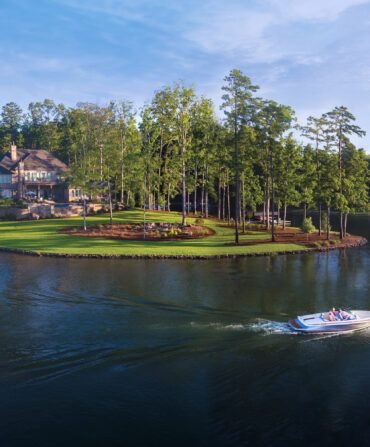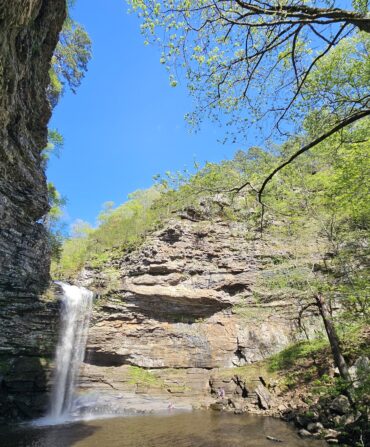When I was ten, my family and I spent a week camping on the White River, just below Bull Shoals hydroelectric dam in northern Arkansas. We weren’t there for leisure. My father, just out of the military and trying to make a start in construction, had taken on a restoration project in nearby Mountain Home. To save him the three-hour commute up from Little Rock each day, we camped.
Our old tent was made of blue-and-white canvas, and my recollection of the nights I slept inside its shelter is inseparable from the remembered smell of mildew. In the mornings, after my father left for work, my mother made the day’s meals and cared for my four-year-old sister, leaving me free to do what I pleased. I wandered in and out of camp, scouting the trails of the state park. More than anything else, though, I loved the river, and I fancied myself a modern-day Huck Finn. Coming off the bottom of Bull Shoals Lake, the White River here is cold year-round and a godsend in the summer heat. I’d descend the hillside to its bank, each step cooler than the last. I’d smell the algae and wet rocks and hear the low whisper of the river slipping by.
The shoals first formed long ago when the river, cutting its way through the region’s limestone, encountered a band of firmer rock. The resulting rapids were tumultuous enough to merit mention in Henry Rowe Schoolcraft’s journal from his 1818–1819 exploration of the territory, when his team nearly lost their canoes. The U.S. Army Corps of Engineers finished the dam in 1951 to control floods and generate electricity, and for a time it was one of the country’s largest concrete dams.
Today there is a $4.7 million visitor center above the dam and kayaks for rent, but the campsite and the stretch of river remain mostly as I remember. When the dam is producing electricity, the White rushes past the campground, but when the generators cycle off, the river grows docile. A rocky sandbar appears. A deeper channel remains on the far side, but the water nearer to the campground becomes slow moving and shallow.
For the week my family spent on the river, our neighbors back home had lent us an inflatable dinghy with a set of oars. The boat was small, probably no more than six feet long, a promotional gift they’d received for opening a checking account. I found the oars impossible to work and soon abandoned them. I cut down and skinned a small scrub tree, fashioning a pole to push myself about, gondolier-like, exploring the banks.
Because of the perpetually cold water, the White below Bull Shoals draws anglers from all over in pursuit of trout. Back home, we lived near a lake, and I had recently grown excited about the esoterica of tackle and technique. Lake fishing involved dangling my feet off the dock and watching my bobber for the telltale wiggle, but river fishing seemed strange and new to me. At my father’s suggestion, I asked fishermen I spotted about their choice of bait. Some used spinner lures. Others plied the river with Day-Glo artificial fish eggs. Both options lay beyond my budget. On general recommendation, I bought a can of kernel corn from the marina store with pocket money I wheedled from my mother. But after a few casts and watching my bait wash quickly downstream, I abandoned my fishing rod to return to the boat.
Slight as the dinghy was, I found endless ways to entertain myself in it. I strung up bottles of Coca-Cola and chilled them in the channel depths. I secured a blockish rock to a length of nylon rope, and it worked as a passing good anchor. I poled out to the sandbar to search for arrowheads left behind by the Osage and other tribes who lived along the river before white settlers forced them off. But mostly I simply drifted, head over the side so I could look down into the clear water, studying the rocks and plants and fish.
Forty years later, I’m a software developer, a husband, a father to two sons, and a writer in the free time I can scrape together. I wring utility from every moment: an hour before breakfast to write, lunch that doubles as conversation time with the boys, household tasks disguised as games on weekends. Multitasking, though effective, can prove Pyrrhic if taken too far. My protection against overoptimization lies in memories like my time on the White River, when I let my mind drift over afternoons empty of structured activity.
A river means change and movement, the water ever new, rushing, replaced. I know that if I go back with my family, the river will be different in some ways, altered by time just as I have been. I now see how my freedom then lay within larger, adult structures and responsibilities that I took for granted even as I benefited from them. I am no longer the child to claim those river discoveries, but the parent who hopes to carve out the space for his own children to explore. In that role I dream of a return: We’ll camp along the bank, find flat stones to skip, sit around the evening campfire, and trade stories. We’ll rent kayaks and explore those cold waters. Maybe we’ll even take along a can of kernel corn. Or maybe my sons will find something altogether new for themselves, something beyond my prescription or guidance, as children often do.









